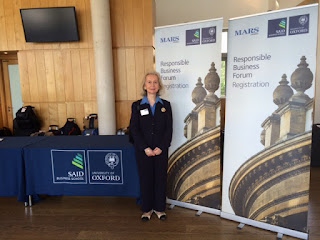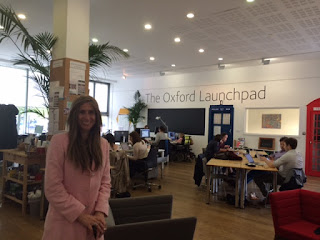The Responsible Business Forum at the Said Business School at Oxford University in England has been a great success and I had the pleasure of hearing multiple executives as well as academics and students speak on and discuss a new paradigm for business in contrast to the doctrine of Milton Friedman, which stated that the purpose of business is to make as much money as possible while conforming to the basic rules of society.
There was also time to meet and chat during breaks in the schedule, which was very intense and incredibly informative.
Executives came from such top companies as Unilever, Mars, which was a co-sponsor of the forum, Al-Sanabel, Danone, and Novo Nordisk, among others.
There were panels by business leaders, financiers, policy makers, and thought leaders, and I enjoyed speaking with Dr. Aleen Westerhof, who is the Coordinator of the European Economic Summit.
The case studies were very interesting to me and what I noticed was that many of these involved food, which is a topic that I have done research on and continue to research, in the context of supply chains. For example, Danone deals with 150,000 dairy farmers and Mars is assisting cocoa farmers and changing their lives for the better. Both companies emphasize mutuality when it comes to stakeholders and empowering those that they do business with. Time and time again, the importance of taking the long view was emphasized. Also having regulations redesigned so the short-term for-profit schema is expanded. The "tyranny of the horizon" was noted with climate change, for example, and I heard of supply value cycles as opposed to supply value chains since resources such as water and energy must be preserved. I was so impressed by Goran Ando, the Chairman of the pharmaceutical company, Novo Nordisk, saying that their manufacturing plants in Denmark were converted to renewable energy and, given that biotechnology is a big consumer of energy, this had a big impact on the bottom line and also is of benefit to the environment. Plans are to scale this to other plants.
Panelists and speakers addressed such major issues as: What is the purpose of business and how can we adopt new supply chains within brands to develop novel ecosystems of businesses, NGOs, governments, and universities to go beyond just financial measures of business performance and to include social and human capital. Time and time again, it was said that "it's not just about profits." I was very impressed by Itzik Zivan, CEO of Al-Sanabel in Israel, whose firm employs many women who are Bedouins to prepare nutritious food for school children. The women are empowered and the children benefit from wholesome, delicious foods in the schools, and Al-Sanabel earns a profit. Al -Sanabek is a social enterprise and Zivan stated that their business model has the following features which others can emulate:
1. A genuine need in the market (3000,000 meals for children) on a regular basis;
2. Market failure - the previous supply chain was broken - many children, especially Bedouin children would not eat the food provided in schools before;
3. Relative advantage- the Bedouin women who are employed to prepare the food make a decent salary and there has been no turnover!
A key issue in terms of responsible business was how to establish trust with suppliers since it takes a long time to build trust and trust is fragile. I also enjoyed hearing "Doing Well by Doing Good," which reminded me of one of my favourite INFORMS slogans: "Doing Good with Good O.R. (Operations Research). Business is also about emancipating people, it was said.
Executives noted their passion and how much they love their jobs and their clients. Institutional investors also need to buy into responsible business. Responsible business is supported by Mutuality - the Interests of Others - and the chocolate company Mars has begun a partnership with the Said Business School at Oxford to research the economics of mutuality. We were all invited to take on the challenges of responsible business whether as practitioners or researchers or policy makers.
We heard of companies working even with their competitors for the common good - impressive! The importance of resources was also a theme and especially knowledge resources and ideas generated by employees. Knowledge is a resource that is not lost when it is shared. The CEO of Danone said that "prosperity does not exist if we don't share it." Keep searching for hidden resources in your value chain and be bold. Also, new distribution channels need to be invested in.
The importance of opening your mind so that you move beyond the boundary of you company and building a new box if you can't work within the existing frameworks made a lot of sense to me.
Also, Ellen, whom I have mentioned in a previous blogpost, who is a PhD student at Said and a fellow network enthusiast, gave me a tour of the Oxford Launchpad at Said, which she is involved in, for entrepreneurship.
And, what could be better than standing in the amphitheatre below, which is part of the business school, and where activities in honor of Shakespeare, as well as other events take place.
Finally, I'd like to thank the Said staff - I do like their special events shirts and think that perhaps we should do something similar at the Isenberg School of Management!
Congrats to the Said School of Business and to Professor Colin Mayer of Said and Bruno Marche of Marson on the success of The Resonsible Business Forum, which was even videostreamed.



























